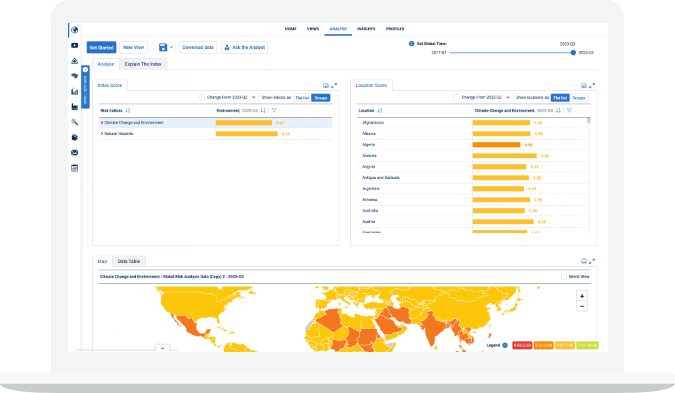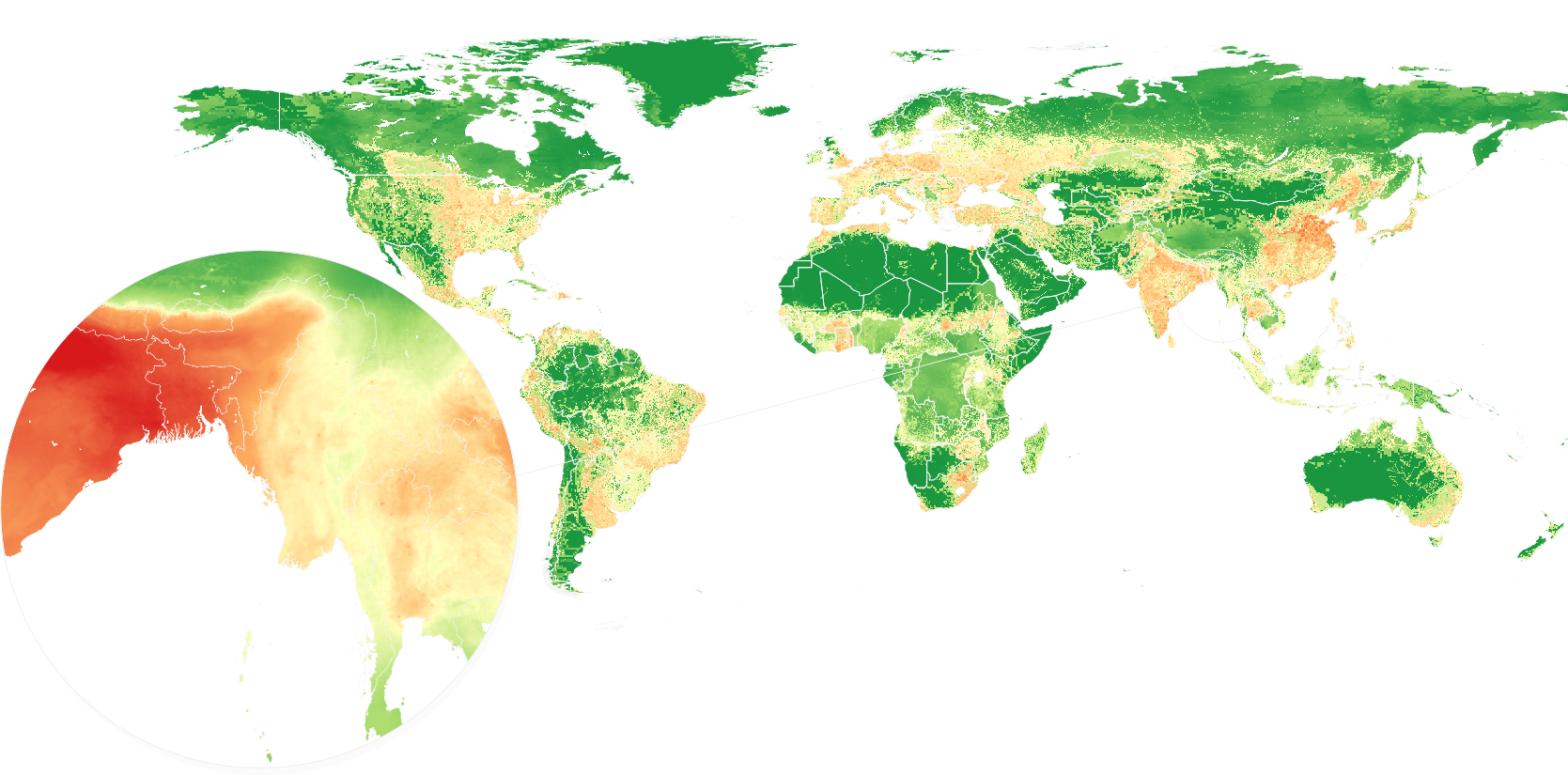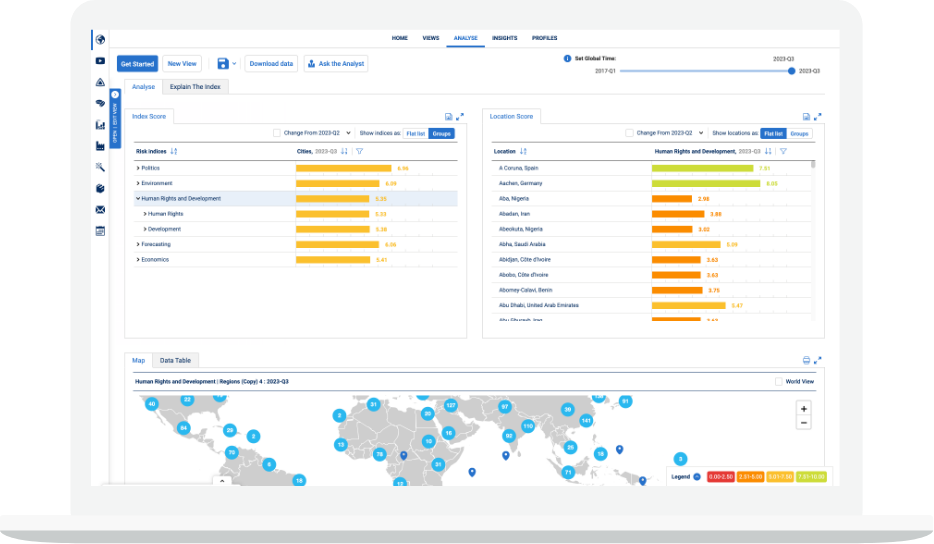Environmental Risk Data
Geospatial insights into nature-related risks to resilience and sustainability
Organisations are coming under pressure to determine how they interact with nature, both in terms of their impacts, but also how much their operations, investments, and strategies depend on natural capital. Both regulators and investors are asking for data-led reporting related to complex areas, including biodiversity, deforestation, water pollution, air quality and waste generation. At the same time, businesses need to successfully anticipate, manage and mitigate disruptions to operations and supply chains from the growing impacts of natural hazards. The amplifying role of contextual factors such as climate change, geopolitics and evolving legislation is also increasingly on the agenda.
Our Environmental Risk Data provides organisations with a global view of their exposure to nature risk and natural hazards, comparable across 198+ countries. Granular subnational data enables screening of assets, suppliers, and portfolios for 22 risk factors covering the state of the natural environment, the legislative situation, and physical threats. The Data enables companies to assess their risk exposure, highlight resilience gaps, identify opportunities to reduce impacts and dependencies, and report those risks and exposures in line with international benchmarks such as the recommendations of the Taskforce on Nature-related Financial Disclosures (TNFD) and the Science Based Targets Network.
Other factors, such as governance, corruption, poverty or indigenous peoples’ rights, can be integrated from other datasets to provide further understanding into the overall environmental risk landscape, while our Climate Risk Data offers powerful geospatial insight into how climate change will evolve over time.
The depth and breadth of the issues covered in the Environment Risk Data provides powerful, geospatial insights that help companies to:
-
Assess
Perform global risk assessments across operations, supply chains and portfolios
-
Report
Align with requirements of the TNFD and other frameworks
-
Locate
Spot commercial opportunities in new and existing markets
-
Mitigate
Isolate exposure to nature-related and natural hazard risks and develop effective mitigation strategies
-
Navigate
Comprehend the legal and regulatory landscape related to natural capital
-
Understand
How your exposure is affected by contextual factors such as governance, indigenous peoples’ rights and poverty
-
Enhance
Build resilience and improve your strategic planning with data-led decision making
The data
Our Environment Risk Data features global risk indices and subnational mapping covering risks to nature, alongside hydrometeorological and geophysical natural hazards, providing a comprehensive picture of the evolving risk landscape.
198
Countries
35
Risk issues
21
Subnational indices
Example issues include:
Natural capital
Biodiversity
Marine & terrestrialDeforestation
Pollution
Air, water, etcCircular economy
Waste generation
Recycling
Natural hazards
Physical risks
Including: Tropical storms, Seismic, Drought, WildfireExposure
Economic, societal, infrastructureImpacts
Economic, societal, infrastructureRegulatory
Deforestation
Interconnected factors in other datasets: Indigenous peoples’ rights, Climate hazards and societal vulnerability, Governance, Poverty, Civil unrest, Government stability
Want to learn about the deeper levels of the indices, the methodology or how they can help you?
Benefits

Benefits
Credible
Our reputation as the leading provider of global risk analytics offers you the confidence needed to make strategic decisions based on data you can trust
Support
An in-house team of experts are on hand to help you with all your needs, from TNFD reporting to global asset screening for disruption and resilience risks
Complete
With data also covering climate change, governance, macro-economics, and social risks we can provide an end-to-end environmental risk solution
Comprehensive
With 190+ climate, environmental political and social risk indices we are uniquely placed to help you understand how these risks interconnect and affect resilience
Transparent
We are transparent in our methodologies, enabling you to interrogate the underlying data and fully understand how we arrive at our risk scores
Features
Advanced analytics
Created by our in-house scientists and data experts our environmental risk indices have been developed to deliver the highest degree of accuracy

Granular
Location scores and interactive maps identify risks at both national and subnational levels across the globe, enabling deeper analysis and more targeted risk prioritisation

Consistent
All our indices use the same comparable scale, helping you identify, prioritise and compare all risks consistently via our GRiD platform or through API

Geospatial
Input your asset or supplier locations into our GRiD platform and combine with our data for instant global risk assessment

Get in touch to learn more about our geospatial insights into nature-related risks to resilience and sustainability
Related content
Capabilities
Climate & environment
Building corporate and investor resilience to climate and environmental risks